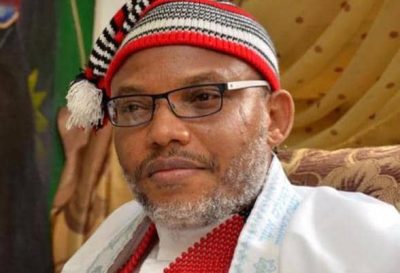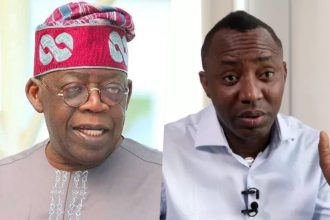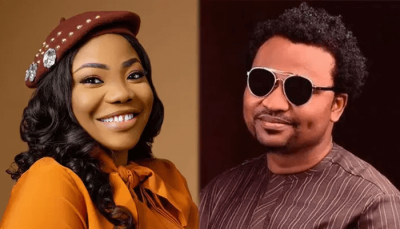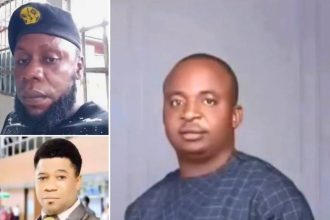The Federal High Court in Abuja has foreclosed the defence of Nnamdi Kanu, leader of the Indigenous People of Biafra (IPOB), and adjourned his trial until 20 November 2025 for judgement in the terrorism case instituted against him by the Federal Government.
Justice James Omotosho decided on Friday after Mr. Kanu, who has been representing himself in court, insisted that he would not proceed with his defence under what he described as a “repealed law.”
Court Forecloses Defence
In his ruling, Justice Omotosho held that Mr. Kanu had been given ample time—six days in total—to conduct his defence but failed to do so. The court, he said, would have extended the allotted period if the defendant had indicated readiness to open his defence.
“This court has given opportunity to the defendant under Section 36 as required by the Constitution, and I will not allow this to continue. The defendant has waived his right,” the judge declared.
He emphasised that Mr. Kanu’s constitutional right to a fair hearing had not been violated since he chose not to use the opportunity provided by the court.

Justice Omotosho noted that counsel had represented the IPOB leader since the case began in his court on 29 March 2025, when he took his plea. The court, in its effort to fast-track the trial, had granted an accelerated hearing.
However, the defence sought adjournments on multiple occasions during the prosecution’s presentation—specifically on 29 April, 2 May, 8 May, 14 May, and 21 May 2025.
The judge also recalled that Mr. Kanu later dismissed his legal team and appointed P.A.N. Ejiofor, Aloy Ejimakor, Maxwell Opara, and Mandela Umegburu as consultants, all of whom were regularly present in court.
Judge’s Remarks and Biblical Analogy
Justice Omotosho, in a notable remark, drew a biblical parallel to emphasize fairness, saying:
“As in the Bible, when God gave Adam the opportunity to explain why he ate the apple, this court has equally given the defendant ample opportunity to defend himself.”
He added that he had personally appealed to Mr. Kanu “in the name of God” to hire a lawyer experienced in criminal procedure, but the defendant refused.

While affirming that the right to fair hearing is fundamental, the judge stated that such right could be waived, and in this case, Mr. Kanu had chosen to do so.
“The defendant has been given ample opportunity to defend himself in this case. I hold that he has waived his right to open his defence,” he ruled.
The court also announced that two motions filed by Mr. Kanu, challenging its jurisdiction, would be decided along with the final judgment.
New Motion by Kanu
Earlier in Friday’s proceedings, Mr. Kanu filed a fresh motion dated 6 November but filed the next day, challenging the legality of the charges against him.
He contended that the Terrorism (Prevention) (Amendment) Act, 2013 and the Customs and Excise Management Act (CEMA), Cap C45, Laws of the Federation of Nigeria, 2004, under which he was charged, had been repealed.
According to him, the continued trial under repealed laws made the entire proceedings a nullity.
Mr. Kanu further alleged that his trial was a “pre-determined conspiracy”, claiming that the British government wanted him convicted and imprisoned — an assertion Justice Omotosho promptly rejected, stating he had no connection with any foreign authority.
“You said the British said this over one year ago? I was not the judge then, and I want to say I have no relationship with the British authorities,” the judge said.
When asked if he was now ready to open his defence, Mr. Kanu replied:
“I am ready, my lord, but I need to know under which law I am being tried.”
He urged the court to strike out the charge and order his release, while commending Justice Omotosho for “fairly guiding the proceeding”.
Prosecution’s Response
Responding, Adegboyega Awomolo (SAN), counsel to the Federal Government, told the court he would not file a counter-affidavit but would rely on Mr. Kanu’s own motion exhibits, which included part of the court’s proceedings where he entered a plea of “not guilty.”
Mr. Awomolo recalled that Mr. Kanu was fully represented by lawyers who cross-examined prosecution witnesses and contested the evidence presented.
He urged the court to regard Mr. Kanu’s motion as his defence and to proceed to judgment.
Reliefs Sought by Kanu
In the fresh motion, Mr. Kanu sought five main reliefs, including:
- An order expunging his plea of “not guilty,” which he claimed was obtained through deception and in violation of his constitutional rights.
- An order setting aside all proceedings conducted pursuant to that plea, arguing they were founded on a nullity ab initio.
- A declaration that the seven-count charge dated 29 March 2025 discloses no offence known to law, as it was based on repealed statutes—the Terrorism (Prevention) (Amendment) Act, 2013 and the CEMA, both repealed by the Terrorism (Prevention and Prohibition) Act, 2022 and Nigeria Customs Service Act, 2023, respectively.
- An order striking out the charge for lack of jurisdiction.
- An order directing his immediate release from custody.
Grounds for the Motion
Mr. Kanu based his application on nine grounds, including:
- That during his plea on 29 March 2025, he initially told the court registrar he did not understand the first count.
- The court failed to provide adequate explanation or interpretation, thereby violating Section 36(6)(a) of the 1999 Constitution (as amended).
- His later plea of “not guilty” was made under pressure, without curing the initial defect.
- The charge remained defective and unamended despite the Supreme Court’s directive on 15 December 2023 to correct citation errors.
- Under Section 36(12) of the Constitution, no one can be convicted of an offence not defined by an existing law, making prosecution under repealed laws unconstitutional.
- His continued detention since June 2021 without a valid charge constitutes a violation of his fundamental rights under Sections 35 and 36 of the Constitution.
Final Adjournment
After reviewing submissions, Justice Omotosho ruled that both parties were deemed to have waived their right to file final written addresses, since the defendant is not a lawyer, while the prosecution was represented by one; filing written arguments would create an imbalance.
The judge then adjourned the matter until 20 November 2025 for final judgement.
Background
Nnamdi Kanu, leader of IPOB, has been in the custody of the Department of State Services (DSS) since June 2021, following his extradition to Nigeria. He faces a seven-count charge bordering on terrorism, treasonable felony, and other related offences.
His trial has been marked by multiple adjournments, a change of lawyers, and numerous interlocutory applications challenging the competence of the charges and the jurisdiction of the court.
Related:









